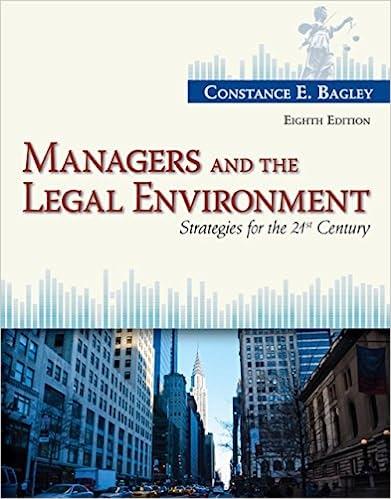In 2013, former National Security Agency (NSA) contractor Edward Snowden revealed information about a mass telephone-call surveillance
Question:
In 2013, former National Security Agency (NSA) contractor Edward Snowden revealed information about a mass telephone-call surveillance program in which the NSA collects "metadata"-numbers called, length of calls, and how many times the numbers are called-from Americans' telephone records every day. Government officials argued that the program is instrumental in fighting terrorism. Certain individuals and civil liberties groups countered that the collection and storage of the vast amounts of data is a violation of privacy under the Fourth Amendment. In December 2013, judges in two different federal districts issued conflicting opinions on the constitutionality of the program.
In Klayman v. Obama, Judge Richard J. Leon of the U.S. District Court for the District of Columbia held that (1) the program constituted a search under the Fourth Amendment and (2) the plaintiffs would likely succeed on their claim that it was unreasonable under the Fourth Amendment. The court explained:
"The basic purpose of th[e Fourth] Amendment . . .
is to safeguard the privacy and security of individuals against arbitrary invasions by governmental officials." The Fourth Amendment typically requires "a neutral and detached authority be interposed between the police and the public," and it is offended by "general warrants" and laws that allow searches to be conducted "indiscriminately and without regard to their connection with [a] crime under investigation." I cannot imagine a more "indiscriminate" and "arbitrary invasion" than this systematic and hightech collection and retention of personal data on virtually every single citizen for purposes of querying and analyzing it without prior judicial approval.
Surely, such a program infringes on "that degree of privacy" that the Founders enshrined in the Fourth Amendment. Indeed, I have little doubt that the author of our Constitution, James Madison, who cautioned us to beware "the abridgement of freedom of the people by gradual and silent encroachments by those in power," would be aghast. (Emphasis added.)
The court granted the plaintiffs' motion for an injunction blocking the collection of metadata from plaintiff Larry Klayman, but it stayed the ruling pending appeal.
Less than two weeks later, in American Civil Liberties Union v. Clapper (James R. Clapper is the director of national intelligence), Judge William H. Pauley III of the U.S. District Court for the Southern District of New York held that (1) the collection of the metadata was authorized by the Foreign Intelligence Surveillance Act and (2) the NSA's program did not violate the Fourth Amendment.
Stressing that the program's purpose is to prevent terrorism, the opinion began by noting that "[t]his blunt tool only works because it collects everything." The court acknowledged that "[s]uch a program, if unchecked, imperils the civil liberties of every citizen," but it nonetheless upheld it:
The right to be free from searches and seizures is fundamental, but not absolute. . . . Whether the Fourth Amendment protects bulk telephony metadata is ultimately a question of reasonableness.
Every day, people voluntarily surrender personal and seemingly-private information to transnational corporations, which exploit that data for profit.
Few think twice about it, even though it is far more intrusive than bulk telephony metadata collection.
There is no evidence that the Government has used any of the bulk telephony metadata it collected for any purposes other than investigating and disrupting terrorist attacks. . . . No doubt, the bulk telephony metadata collection program vacuums up information about virtually every telephone call to, from, or within the United States. That is by design, as it allows the NSA to detect relationships so attenuated and ephemeral they would otherwise escape notice. As the September 11th attacks demonstrate, the cost of missing such a thread can be horrific. . . .
"Liberty and security can be reconciled; and in our system they are reconciled within the framework of the law." . . .
For all of these reasons, the NSA's bulk telephony metadata collection program is lawful.
Which argument do you find more persuasive? Why? Do you think the Founders would have considered Snowden a traitor or a patriot?
Step by Step Answer:

Managers And The Legal Environment Strategies For The 21st Century
ISBN: 9781285860374
8th Edition
Authors: Constance E. Bagley





